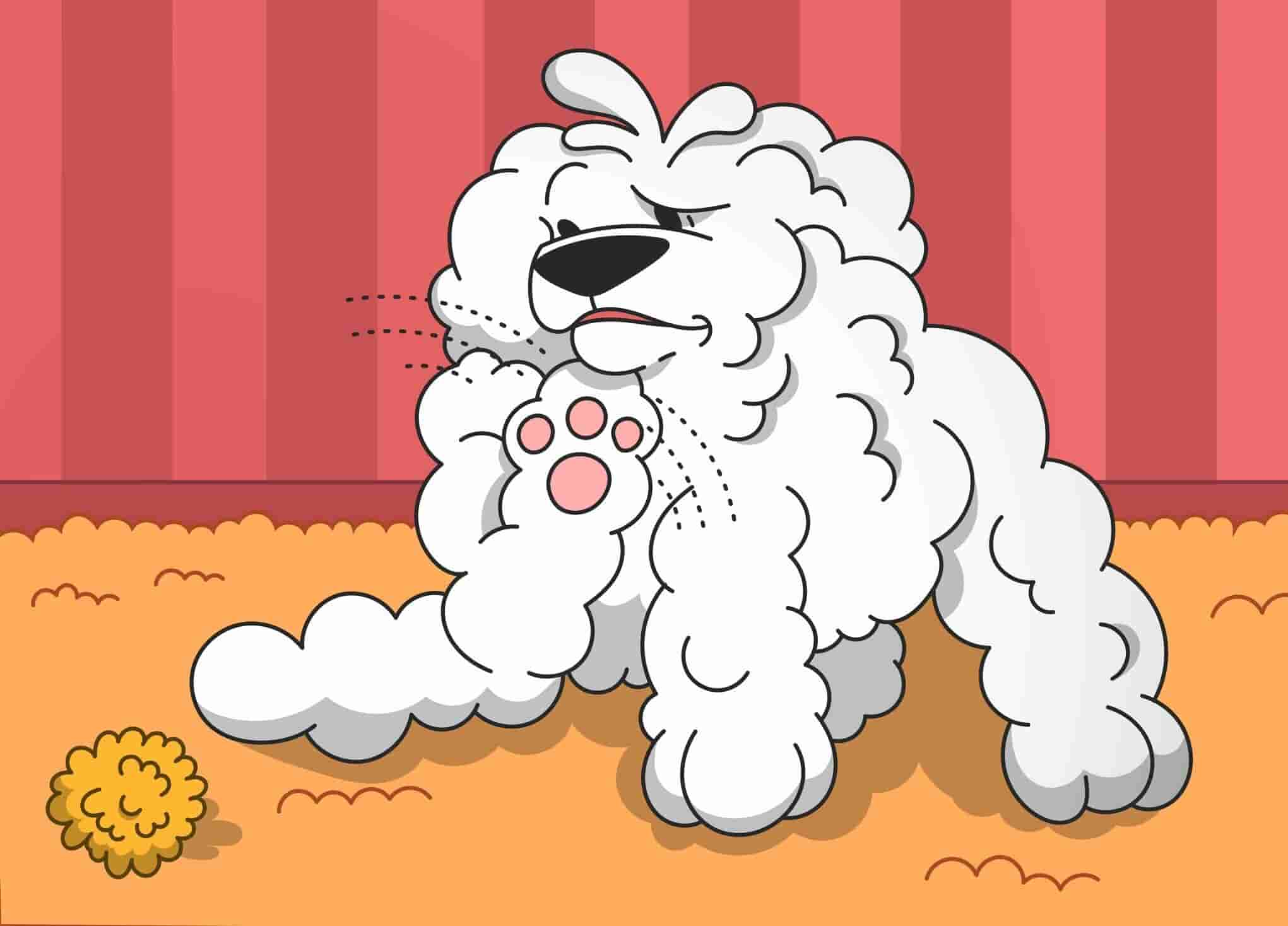While many humans have pet allergies, pets' immune systems can fail them too. Like in people, allergy symptoms in dogs and cats develop when their immune systems recognize certain everyday substances (or allergens) as dangerous. Dogs love to scratch or chew, but if your pup does it excessively, they might be suffering from an allergy.
And, just like in humans, allergies can cause your pet significant discomfort, so it's good to get to the root of the problem as soon as you spot the signs.
What are dogs and cats allergic to?
Allergies in cats and dogs fall into a few main categories. Environmental allergies include things like mold, dust, and grass, resulting in skin conditions like itching and rashes.
Food allergies are another common type of allergy and can result in digestive and respiratory issues and skin issues.
Pets can be allergic to various things, including environmental factors, household items, and food substances.
A few common allergens include:
- tree, grass, and weed pollens;
- food ingredients (e.g., beef, chicken, pork, corn, wheat, or soy);
- dust and house dust mites;
- cigarette smoke;
- prescription drugs;
- fleas and flea-control products;
- dander;
- cleaning products;
- insecticidal shampoo;
- perfumes;
- fabrics.
Seasonal allergies in dogs
Furry family members, especially dogs, can also spend the spring season feeling miserable thanks to pollens and other environmental allergens. Dogs' seasonal allergies are commonly caused by environmental allergens such as dust mites, fleas, molds, and pollens from grasses, trees, weeds, and flowers.
Pay close attention to your dog's belly, paws, ears, face, and armpit region. If your dog is constantly licking, that could be one of the allergic reaction symptoms.
If your dog has skin allergies, their skin will become very itchy. They can start licking or scratching excessively and might bite or chew at specific areas of their body. Your pet may rub themselves against vertical surfaces like furniture or scoot across the floor.
As the itch-scratch cycle continues, the skin may become inflamed. Hot spots can develop that can eventually lead to bleeding or hair loss.
Seasonal allergies in cats
According to veterinarian research, few cats suffer from seasonal allergies. They can sneeze more due to physical irritation from pollen. If you notice excessive sneezing, keep cats inside when the pollen count is expected to be high outside.
To reduce the amount of pollen tracked into your home, remove shoes at the door or invest in a thick welcome mat. However, those few cats with allergies will display similar allergy symptoms to dogs.
General symptoms of allergies in pets
Unlike humans, whose allergy signs usually involve the respiratory tract, symptoms of dog allergies and cat allergies more often take the form of skin irritation or inflammation – a condition called allergic dermatitis.
General symptoms of skin allergies in dogs and cats skin allergies are:
- extensive itching;
- red, irritated skin;
- obsessive licking;
- hair loss;
- hot spots;
- skin rash or hives.
While respiratory symptoms aren't common in dogs and cats with allergies, they still occur. A runny nose, eye discharge, coughing, and sneezing are typical allergy symptoms in four-legged allergy sufferers.
How to treat pet allergies
It's essential to address the issue at the first sign of discomfort. The more your pet is exposed to the allergens they are sensitive to, the more intense and long-lasting their allergic response can be.
Some pets have mild, seasonal symptoms that can be managed by bathing with a hypoallergenic shampoo or applying a medicated spray.
The best treatment for allergies is to remove the allergens from the environment. Easier said than done, however. If you are not sure what causes your pet's allergic reaction, check with your veterinarian.
After conducting a physical examination, they may be able to determine the source of your dog's allergy. If not, your vet can recommend skin or blood tests or a special elimination diet to determine what's causing the allergic reaction.
Online Vet & Emergency Fund
While allergies can cause your pet severe discomfort, few are ever life-threatening. It's not always obvious what could be causing your pet's allergies, but if you sign up with Petcube's Online Vet, you'll have a team of trained veterinarians available to you instantly via your phone.
Whenever you have a concern regarding the health and well-being of your pet, send a quick text message, attach a photo or video, and get an instant reply.
With the Online Vet service, you can cut down on unnecessary vet visits, which will save you money, but it will also protect your darling companion from the trauma of a vet visit that maybe wasn't necessary at all.
You can also subscribe for an emergency fund which will pay out to the value of $3000 annually for emergency vet care. In an emergency, the last thing you want is to have to make a decision for your pet's well-being based on your financial situation at the time. An emergency fund will give you peace of mind that your pet will get the care they need in an emergency.
FAQ
Can pets be allergic to food?
It often comes as a surprise to some pet parents that their four-legged friends can also suffer from food allergies. Hypersensitivity to food can develop in any breed at any age, even to something your cat or dog has eaten for years. It often takes some detective work to find out what substance is causing your pet allergy.
Cat and dog food allergy symptoms are similar. They will typically have itchy skin, chronic ear infections, or gastrointestinal problems like diarrhea and vomiting. An elimination diet can be used to determine what food your cat or dog has an allergy to.
Read more: Healthy Ways to Treat your Dog or Cat
Common dog food allergies
Dogs' food allergies are common and can result in anything from itchy skin to vomiting and diarrhea.
Foods that are most commonly the cause of dog food allergies include:
Chicken allergy symptoms in dogs are common and can cause your dog a lot of discomfort. Wheat gluten allergy is thought to be rare among dogs, despite how popular grain free diets are.
Diagnosing a food allergy in dogs usually requires a strict hypoallergenic diet for up to twelve weeks. We'd recommend working with your vet through this process as it must be carefully managed.
There are also blood tests that can indicate an allergy to specific foods.
Common cat food allergies
Cats also experience food allergies from time to time. These allergies can develop at any time, so they can come out of the blue after years of eating a particular food.
Ear infections and sometimes vomiting and diarrhea can result from a food allergy and the more common overgrooming and itching from cat skin allergies.
Foods that often cause allergies in cats include:
How often should I bathe my dog with skin allergies?
You may have been told that bathing your dog too often can strip the skin of natural oils and should be avoided.
But, if your dog has itchy skin from allergies, it's a good idea to bathe them once or twice a week. This helps eliminate the allergen that may be irritating, like pollen, mold, or mites. Using cool water can help to soothe inflamed skin and ease the pain and itching.
Consult your vet to ensure that you aren't bathing your pet too often. Also, your vet will prescribe the right products that won't further irritate the skin. Generally, a mild, soap-free shampoo should be ok, but you may need a medicated dog allergy shampoo depending on the skin condition.
Are there any home remedies for pets with skin allergies?
It can be tough to see your pet scratching and itching constantly. While we always recommend that you visit your vet to determine the root cause and best course of action, there are some things you can do at home that may ease the discomfort.
Tea baths can help soothe and calm irritated skin. Chamomile, calendula, and green tea bags chucked into a warm bath can be helpful. Allow your pet to soak for up to five minutes, or pour it over them using a cup.
Apple cider vinegar spray can help relieve irritation on your pet's itchy skin. Use a 50/50 mixture of water and ACV in a spray bottle for portability or in a bath.
Coconut oil has antibacterial and antifungal properties, which can help your pet's skin allergies. Coconut oil may be beneficial in treating eczema, allergies, and even insect bites. Keep your coconut oil in the fridge, making it hard and easier to apply. In the meantime, don't forget to discuss its use with the vet first.
While these home remedies may be helpful, there are dog/cat skin allergy treatments available with your veterinarian if simple home measures are not sufficient.
My pet is scratching their ears a lot - what does this mean?
Dogs and cats with allergies also often have problems with their ears – especially dogs. The ear canals may become itchy and inflamed as part of a generalized allergic response or grow infected with yeast or bacteria.
Signs your pet's ears are giving them problems include:
- scratching ears;
- head shaking;
- hair loss around the ears.
If your dog's ears are affected by allergies, your dog will shake their head often due to the irritation. They may also not want you to touch their head. If an infection is present, there will usually be an odor or discharge from the ears.
My pet has eye discharge from allergies - what should I do?
Cat allergies can cause your cat's eyes to be watery and irritated. Common allergies that can affect your cat's eyes include pollen, mold, dust, perfumes, household cleaning products, and some medications.
If you know what's causing the irritation to your cat, you can limit your cat's exposure. If not, then a visit to the vet can help you identify the cause. Red eyes are a sign of something more severe and should be checked out by a vet.
Pollen and dust can also lead to eye discharge in dogs. Eye allergies in dogs can lead to a clear, watery discharge which can form eye boogers and goop if it continues for a few days. These allergies in dogs usually not only make their eyes water, but they can also cause a runny nose and sneezing too.

Was this article helpful?
Help us make our articles even better










